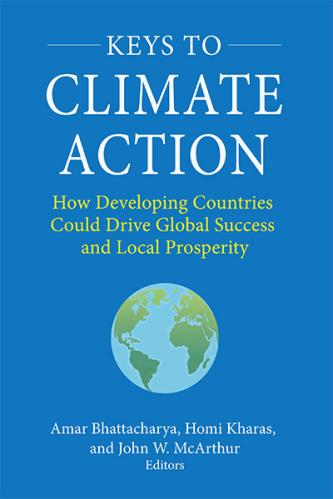

Past Event
The start of the 21st century has been an auspicious period for global economic development. In the 1990s, a mere 13 emerging economies succeeded in growing at a speed at least twice that of the OECD countries, enabling rapid convergence on Western living standards. By the first decade of the 2000s, this number had mushroomed to 83. Accelerated rates of economic growth lay behind many of the recent success stories in global development, not least the fulfilment of the first Millennium Development Goal to halve the global poverty rate, five years ahead of the 2015 deadline. Yet in a number of places, growth has failed to take off, has undergone periodic reversals, or has benefited a few while leaving the majority short-changed.
On August 7-9, 2014, Brookings Global Economy and Development is hosting the eleventh annual Brookings Blum Roundtable on Global Poverty in Aspen, Colorado. This year’s roundtable theme, “Jump-Starting Inclusive Growth in the Most Difficult Environment,” brings together global leaders, entrepreneurs, practitioners, and public intellectuals to discuss what strategies exist for promoting inclusive economic growth in settings where standard prescriptions are not feasible or sufficient as well as what the comparative advantages are of different actors seeking to improve the prospects for inclusive growth and how can they most effectively collaborate with each other to increase their impact.
This event is closed, but you can follow along on Twitter using #Blum2014.
Thursday, August 7, 2014
Welcome – 3:30-4:00 p.m.:
Opening Remarks:
Session I – 4:00-5:00 p.m.: How Can Multinationals Engage With Governments to Support Economic Development?
Multinational corporations are increasingly recognized as key partners for governments in development planning. Corporations are brought into discussions at various levels: around individual projects and their impact on affected localities; on sector performance, regulation and competition; and on country-level issues such as the business environment, infrastructure, jobs, and skills.
What motivations do multinationals have to participate in government engagement? Do discussions work better under formalized and multilateral structures, such as business councils, or on an ad-hoc bilateral basis? How does engagement differ in poor and weakly governed countries?
Moderator:
Introductory Remarks:
Aspen Institute Madeleine K. Albright Global Development Dinner & Lecture – 7:00-9:30 p.m.:
The Aspen Institute Madeleine K. Albright Global Development Lecture recognizes an exceptional individual whose vision has provided breakthrough thinking to tackle the challenges of global development.
Featuring:
Friday, August 8, 2014
Session II – 9:00 – 10:30 a.m.: Managing Risks in Conflict Settings
Ending extreme poverty over the next generation will require inclusive and sustained growth across the developing world. This is a particularly onerous challenge in fragile and conflict-affected states, which account for a growing share of the world’s poor. There is growing recognition that fast economic recovery, and the jobs that go with it, can serve to shore up peace agreements and help countries successfully transition beyond the immediate post-conflict phase.
What can be done to support investors and entrepreneurs weighing up the risks and opportunities of starting or expanding business in these settings? What risk-mitigating instruments and strategies work? How can corporations identify, foster and partner with local businesses to support job creation and private sector development?
Moderator:
Introductory Remarks:
Session III – 10:50-12:00 p.m.: Leap-Frogging Technologies
Weak legal and regulatory frameworks, crime and corruption, deficient infrastructure, and lack of access to finance are common constraints to many developing economies. New leap-frogging technologies offer poor countries the potential to overcome some of these challenges without the cost, capacity or good governance required from traditional solutions. Mobile technology, powered by nearly five billion mobile subscriptions worldwide, provides a platform through which to do business and expand financial services. Off-grid power and the internet offer other examples of how weak infrastructure and missing public goods can be circumvented. Special economic zones and charter cities offer the possibility of forging oases where economic conditions are favorable.
On what conditions, if any, does successful leap-frogging depend? What type of financing instruments do innovators look for when designing and marketing such technologies? What are the sources of growth in low-income countries and what can they tell us about new growth strategies?
Moderator:
Introductory Remarks:
Session IV – 2:00-3:30 p.m.: Delivering Government Partnerships
With President Obama’s June 2013 announcement of Power Africa, the U.S. government is demonstrating its new vision for development built on public-private partnerships. Historically, such partnerships have a mixed tracked record.
How can we make sure that Power Africa, Feed the Future, and similar partnerships deliver to their full potential? What have we learned about structuring effective government-business-donor cooperation?
Moderator:
Introductory Remarks:
Saturday, August 9, 2014
Session V – 9:00-10:30 a.m.: Unlocking Big Deals
Massive infrastructure gaps in the energy, transport, information and communications technology, water, and urban sectors threaten the long-term competitiveness and prospects for sustainable development across many countries. This realization has spurred interest from countries, donors, regional groups and development finance institutions to devise new ways of overcoming constraints to mega-investment deals, particularly agreements that are cross-border in scope. Identified constraints include a shortage of early-stage project development finance; skilled legal, technology and financial experts; and instruments to attract additional capital from external players like institutional investors and international investment banks.
How can constraints to big deals be overcome, and what are the ingredients that allow for enduring partnerships to deliver on these projects? Are dedicated pools of financing needed to unlock these deals?
Moderator:
Introductory Remarks:
Session VI – 10:50-12:20 p.m.: Where Can Enclave Projects Take Us?
Recent discoveries of natural resource wealth in East Africa offer the promise of supercharged growth in one of the world’s poorest regions. A critical challenge is to leverage the capital, skills and knowledge generated from enclave growth to support nascent other industries.
How can corporations, government, and NGOs support structural transformation away from enclave activities? What sorts of industries present the most feasible small steps away from extractive sector activities?
Moderator:
Introductory Remarks:
Closing Remarks:
9:00 am - 5:00 pm
On August 7-9, 2014, Brookings Global Economy and Development hosted the eleventh annual Brookings Blum Roundtable on Global Poverty in Aspen, Colorado under the theme, “Jump-Starting Inclusive Growth in the Most Difficult Environment.”

Pedro Conceição
April 3, 2024

January 23, 2024

Amar Bhattacharya, Homi Kharas, John W. McArthur
November 15, 2023